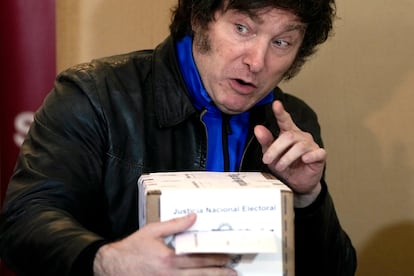War of the ballots in Argentina: Javier Milei fuels suspicion of electoral fraud without evidence
The far-right candidate’s team says it is holding on to ballot papers until the run-off vote on Sunday to ensure they are not torn or misplaced


Javier Milei’s distrust of Argentina’s electoral system is complete. Without legal evidence to support his claims, the ultra-libertarian presidential candidate has denounced that the general election of October 22 had irregularities “that call into question the results.” Milei is questioning the second place he obtained with 30% of the votes, behind Sergio Massa, from the left-wing Peronist movement, who was close to 37%. With a view to the decisive run-off vote on Sunday, Milei has fueled the bonfire of fraud and clashed with the electoral system by making a last-minute change in the dynamics of preparation for the election.
His party, La Libertad Avanza (LLA), has delivered a much lower number of ballot papers to election authorities than expected in the country’s largest province, Buenos Aires. Milei’s team confirmed that it has decided to retain them and distribute them through its own election controllers to prevent them from being destroyed.
In Argentina, each party is responsible for printing its own ballot papers, but it receives significant funds from the state to do so. For the run-off vote, the figure rose to 258.3 million pesos (about $706,000) for both Milei and Massa. Once the ballots have been printed, the parties send them to the Electoral Justice body so that they can be distributed through the state mail company and reach each polling station. The change of course taken by LLA has set off alarms in the final stretch of a tense campaign.
The fight broke out hours before the televised debate between the candidates. The Buenos Aires Electoral Board warned that LLA had presented a “substantially smaller” number of ballots than expected and that it had failed to comply with the regulations by doing so in closed cardboard boxes or in black plastic bags “which make their control and verification difficult and causes delays.”
In a statement, the organization stressed that, in many cases, the number of bundles received “is not enough to cover all the tables in the municipalities that are being processed for delivery to the Post Office.” To address this problem, the Electoral Board indicated that it was being forced “to take bundles from the contingency bags, or even subtract them from other municipalities for subsequent processing, in order to complete the tables.” According to the Argentine electoral justice system, Milei’s party has used a similar technique in the Argentine capital and in other provinces, but on a smaller scale than in the province of Buenos Aires.
Milei’s team counterattacked, assuring that the money received was used to print ballots, but that they will keep many of them until Sunday. In their opinion, the only way they can guarantee that there are valid LLA ballots at all voting stations is extreme oversight. If their controllers detect that they are missing at a given polling station, they will replace them. “Many more ballots have been printed than are required; in previous elections we had many destroyed and stolen,” said vice presidential candidate Victoria Villarruel after the debate.
The most populated province
The target of Milei’s ire is the province of Buenos Aires, the scene of the biggest electoral battle and the main bastion of Peronism. With 13.1 million voters, whoever wins there is almost guaranteed victory at the national level. On October 22, Massa obtained 4.2 million votes, compared to the 2.5 million obtained by Milei. Both are now courting the third-placed party, Together for Change, which obtained 2.3 million votes in Buenos Aires, 24% of the total.
Milei’s party would normally have to deliver a bundle of 350 ballot papers to each of the 38,074 polling stations. In many cases, they did not even reach 100. The LLA representative, Santiago Viola, said that the party has not failed to comply with any legal resolution “and has provided ballot papers to all voting stations in the amount that is estimated to be necessary for the start of the election.”
Their own controllers will be provided with additional ballots and when they detect that there are no more left at a given polling station, they will replace them. “Exercising the freedom to choose, and in order to avoid breakage and theft of ballot papers, such as those that occurred throughout the country in previous elections, we have made the decision to redouble our efforts,” added Viola.
LLA’s claims of irregularities are limited to the public sphere and the party has not filed any formal complaints through the justice system. For this reason, his Peronist rival believes that this is a strategy similar to the one used by Donald Trump in the United States and Jair Bolsonaro in Brazil to sow doubts in the event of a potential unfavorable result. “It strikes me that in the primary, when the result favored Milei, there was no suspicion and in the run-off, because they can lose, suspicion is established,” Massa said in an interview with EL PAÍS.
The run-off vote will be held on the eve of the 40th anniversary of Argentina’s return to democracy. The strength of the system will be tested.
Sign up for our weekly newsletter to get more English-language news coverage from EL PAÍS USA Edition
Tu suscripción se está usando en otro dispositivo
¿Quieres añadir otro usuario a tu suscripción?
Si continúas leyendo en este dispositivo, no se podrá leer en el otro.
FlechaTu suscripción se está usando en otro dispositivo y solo puedes acceder a EL PAÍS desde un dispositivo a la vez.
Si quieres compartir tu cuenta, cambia tu suscripción a la modalidad Premium, así podrás añadir otro usuario. Cada uno accederá con su propia cuenta de email, lo que os permitirá personalizar vuestra experiencia en EL PAÍS.
¿Tienes una suscripción de empresa? Accede aquí para contratar más cuentas.
En el caso de no saber quién está usando tu cuenta, te recomendamos cambiar tu contraseña aquí.
Si decides continuar compartiendo tu cuenta, este mensaje se mostrará en tu dispositivo y en el de la otra persona que está usando tu cuenta de forma indefinida, afectando a tu experiencia de lectura. Puedes consultar aquí los términos y condiciones de la suscripción digital.








































